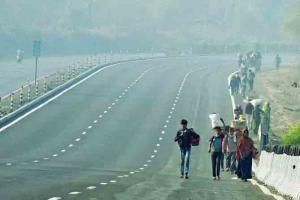As the Indian middle classes and the elite stocked and restocked essentials, the State slathered them with directives, manuals, policies and tutorials on washing hands and respiratory hygiene

Migrant workers walk to their native places. File pic/ Syresh Karkera

ADVERTISEMENT
For India's labouring poor, COVID-19 is not the great leveler. It is a mere reiterationof their disposability as workers, identity as the'other', and expendability as citizens. The global pandemic has catapulted the migrant labourer once again as subjects ofcharity, objects of (mis)governance and bodies of disease and stigma. The most glaring gap is the labour migrant falling through the cracks yet again, not included in the national response to a global pandemic.
As the Indian middle classes and the elite stocked and restocked essentials, the State slathered them with directives, manuals, policies and tutorials on washing hands and respiratory hygiene. On the contrary, the poor continued to labour amidrumours, misinformation and fear about the virus, with minimal state information. The sudden imposition of a nationwide lockdown in response to COVID-19 caught the migrants unawares and unprepared.
So, why did the State, policy makers and experts forget the lakhs who belong to the cities? It points to the exclusively middle-class imagination of the urban, and hence, policies of containment of the infection focusing on work-from-home, social distancing and self-quarantining, practices not known or feasible for the poor.
The invisibilisation of the urban poor in the conscience of the State is so complete that they are not planned for when they are the most vulnerable and perhaps also the key to the successful management and containment of the pandemic.
The question 'Why can't the migrants stay where they are once provided with shelter, food and other essentials?' baffles many. The answer is simple. Migrants are individuals with agency, a sense of self and respond to universal human instincts like everyone else. As everyone else, in times of disease and distress, the migrant seeks the security of home and family and reliability of social networks.
The State may think of the poor migrant as lesser citizens, but to expect the migrant himself to take decisions that go against his mere survival is unreal. Their desperation to reach their homes and villages is also indicative of the fragility of their economic life in the city. How precarious is the migrant every day that a lockdown amidst a pandemic pushed them out of a city overnight? The distress in which migrants find themselves today across Indian cities, raises questions on the lack of both knowledge and empathy, and makes one wonder if the State even knows who it governs beyond mere IDs and Aadhaars.
Overnight, the people who carry the weight of the neoliberal city, have become carriers of disease. The 'urban nuisance' is now the 'diseased migrant body', stripped of all identity and dignity, waiting at closed doors, workplaces and state borders. The stigma of disease and the migrant surface very often, shifting focus from the perils of poverty, poor nutrition andinhuman living conditions in the city, to the migrant as carrier of tuberculosis, HIV, SARS and now, the COVID-19.
Just when we thought the arrogance and apathy of the State could not get worse, images ofmigrant laborers being disinfected with bleach surfaced in Uttar Pradesh. The state and middle-class imagination of the urban has stigmatised the labouring migrant as a potential threat to the safety and wellness of its bourgeoise.
At the other end, states of origin like Uttar Pradesh and Bihar, have disallowed migrants from coming back to their villages. While the war against the pandemic will be won sooner or later, the migrant will need more than bleach and disinfectants to shed the stigma, of disease and otherness.
Thus, COVID-19 is not the great leveller; it is more. The disease is a mirror to the State and society, reflecting its inadequacies of governance, and more importantly, its lack of humanity. The State may do everything in its might to hold the migrant body, keep it contained and static, but the migrant will walk, and find ways to get back home. And they will also be the first ones to come back, to our homes, our offices, our factories, construction sites and our cities, making it run again, and become the carriers of the city again.
The writer, a doctoral candidate at the Tata Institute of Social Sciences, works on the intersection of mobility, healthcare and the urban in India
Catch up on all the latest Mumbai news, crime news, current affairs, and also a complete guide on Mumbai from food to things to do and events across the city here. Also download the new mid-day Android and iOS apps to get latest updates
 Subscribe today by clicking the link and stay updated with the latest news!" Click here!
Subscribe today by clicking the link and stay updated with the latest news!" Click here!






